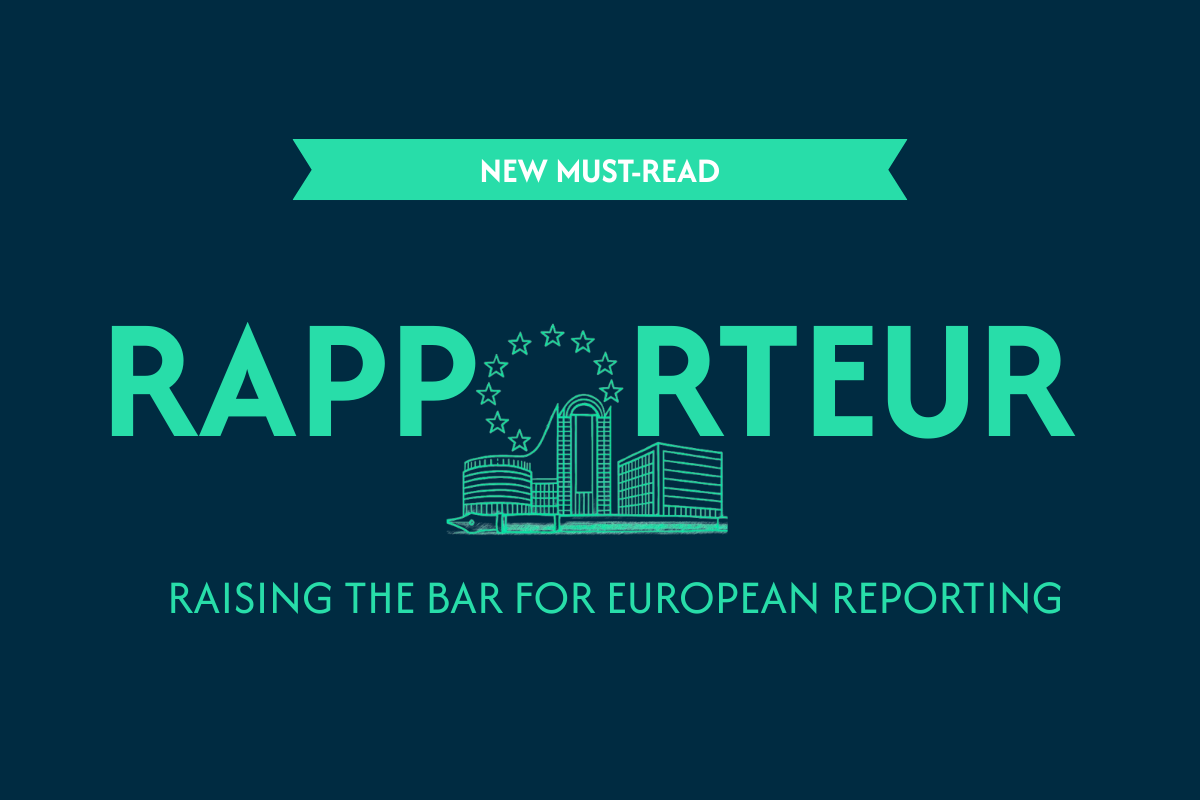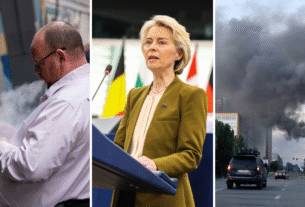Welcome to Rapporteur, a free daily briefing on Europe. I’m Nicoletta Ionta, with your Friday edition.
I arrived in Brussels thinking I’d stay for three months. Two and a half years later, I’m still here. This city operates round the clock – a 24/7 hub where politics bleeds into dinner. Not so tiny, yet everyone knows everyone, just like the Italian island I grew up on. They don’t call it the Brussels bubble for nothing.
A big thanks to the 150 of you who joined our launch party last night, and to our newsroom for making Rapporteur possible!
Eddy Wax is back in your inbox from Monday.
Need-to-knows:
- Gaza: European Parliament calls for member states to recognise Palestine
- Poland: France pledges to send warplanes amid NATO defence boost
- Belarus: Detained EU staffer Mikalai Khilo freed in prisoner deal
Today’s edition is powered by the European Commission
Big breakthroughs begin with bold ideas. Join us at the European Research and Innovation Days 2025 with Commissioner Ekaterina Zaharieva on 16 and 17 September for two days of debate, live testimonials and forward-looking sessions on the future of European competitiveness and resilience. Be part of shaping EU policy!
Register now.
In the capital
The Strasbourg plenary session this week became the stage for France’s political spectacle, with Ursula von der Leyen caught in the crossfire and Brussels scrambling to work out how – or even if – two no-confidence motions against the Commission can co-exist.
The Left officially threw down the gauntlet on Thursday. Co-chair Manon Aubry announced her group had filed a motion of censure against the executive. But it wasn’t just a far-left salvo: firebrand Jordan Bardella – president of France’s National Rally and leader of the far-right Patriots for Europe group – had already tabled his text a day earlier, just after von der Leyen’s State of the Union address.
He slammed the Commission as “powerless” on the world stage and likened von der Leyen to Emmanuel Macron. The whole show felt less about Brussels than a clumsy rerun of Parisian drama transplanted into Strasbourg.
Bardella declared it “a vote of confidence for or against Ursula von der Leyen’s Europe, for or against Emmanuel Macron’s Europe” to a half-interested crowd, preoccupied with news from Paris, where Macron had just tapped Sébastien Lecornu as prime minister after François Bayrou’s government collapsed in a crushing confidence vote.
The Q&A that followed the censure announcement quickly became a seminar on French politics. Bardella eventually squirmed, even pleading at one point for questions on “European challenges.”
And then came the déjà vu moment: Bardella hinted his group could even back the Left’s text – echoing the upheaval back home when the far right crossed party lines to bring down Bayrou.
After months of posing as the “responsible opposition” that wouldn’t push France into chaos, Marine Le Pen’s National Rally joined left and far-left parties to block Bayrou’s austerity programme, which called for freezing welfare benefits and scrapping two public holidays.
Back to Strasbourg. Asked if far-right backing of their censure motion made things awkward, Aubry told Rapporteur: “There’s nothing we can do. They’re just replicating what they did in France.” But she cautioned: “They pay little attention to content. Do they now really agree to act against the genocide in Gaza, or against the green backlash?”
Here’s the kicker: no one in Brussels knows how two censure motions can coexist; parliamentary rules don’t spell it out. “Subsequent steps will be established after verifications,” EP services told Rapporteur. Never before have two such motions landed at once.
The far right’s failed attempt in July already cracked Pandora’s box, showing how low the bar lies to table a censure motion. Only 72 signatures.
What happens now lies with the Conference of Presidents, Parliament’s leadership body, which will handle the scheduling of both motions once legal services have checked their validity – a process that could take some time. Until then, Parliament is in uncharted waters.
France readies fighter jets as NATO boosts defences
Several NATO members are sending troops, artillery, and air defence systems to secure its eastern flank after a swarm of Russian drones flew into Polish airspace on Wednesday.
In response, Warsaw scrambled forces to shoot them down. The Netherlands and the Czech Republic have pledged defensive support to the country. Germany said it would “intensify its engagement along NATO’s eastern border” and expand air policing over Poland. On Thursday night, Macron announced that France would send three Rafale fighter jets to help secure Polish airspace.
Ukraine’s Hungary charm offensive
With Hungary still blocking Ukraine’s accession to the EU, Kyiv is trying out a new argument: enlargement is really boring. On Thursday in Budapest, Hungary’s Foreign Minister Péter Szijjártó met Ukraine’s deputy PM Taras Kachka, offering a long list of familiar complaints about Ukraine’s suitability for membership.
Before the meeting, Kachka told Eddy Wax that his aim was to “convince Hungary that this is something technical.”
Ukraine wants Hungary to allow the first cluster of negotiating chapters to open. “Even if they have their own opinion about the future of Ukraine in the EU it doesn’t mean that they should block technical preparations,” Kachka said during a sit-down with Rapporteur in Brussels. “Give us a chance to pass the exam.”
His plan A is to keep working on technical preparations with the Commission’s help. Asked if that meant he’s waiting for Viktor Orbán to be voted out next year, Kachka gave a categorical “no!”
“Hungary will always be our neighbour,” he said. “It’s important for us to be engaged with them.”
EU diplomat freed from detention in Belarus
Mikalai Khila, a local staff member at the EU mission in Minsk, has been released after being detained since 2024 to serve a four-year prison sentence.
His release was part of a broader move that freed 52 individuals from custody. Both von der Leyen and Kaja Kallas celebrated the news, publicly thanking Donald Trump for his role in facilitating the release.
European Parliament urges states to recognise Palestine
Lawmakers have passed a resolution calling on the bloc to recognise Palestinian statehood as part of a two-state solution, while backing measures against Israel that von der Leyen presented in her State of the Union speech, including sanctions on violent settlers and a partial suspension of the bilateral agreement.
The vote was 305 in favour, 151 against, and 122 abstentions.
Jointly presented by the Socialists, Renew, and Greens, the resolution also calls for stronger EU action on famine in Gaza and the release of hostages. The text emerged after tense negotiations, with references to “genocide” and sanctions against Israeli ministers removed to secure agreement.
Charlie Kirk murder divides Parliament
The assassination of American conservative pundit Charlie Kirk sparked a bitter debate among EU lawmakers on Thursday over whether to honour him with a minute of silence, Magnus Lund Nielsen reports.
Kirk was shot dead onstage at an outdoor event in Utah on Wednesday. Hours later, Charlie Weimers of the hard-right ECR group called for colleagues in Strasbourg to hold a minute of silence during Thursday’s plenary. He was briefly allowed to speak under procedural rules, but Parliament insiders told Euractiv the chamber declined to approve the tribute.
SAFE wannabe friends list grows
EU ambassadors are meeting today to discuss whether they can use the bloc’s €150 billion SAFE loans programme to buy arms in the UK and Canada, provided both countries pitch in as well.
France wants the participation capped at 50% of the value of purchases, to give priority to European defence manufacturers. As the 27 discussed London and Ottawa’s inclusion, Ankara and Seoul also applied. The Commission will first assess if they meet the requirements before deciding whether to propose that the Council reopen negotiations. Turkey faces an uphill battle, with long-standing opposition from countries such as Greece to its role in European defence.
When it comes to how the EU countries want to use the loans, it’s time to get to the drawing board. National envoys have been invited to initial meetings with the Commission this month to lay out ideas for their plans – what to buy and how much to spend. The executive has already circulated a template.
Debate heats up over EU’s 2035 petrol car ban
Carmakers are in Brussels today for another high-level industry dialogue – and there’s more at stake than usual at the CEO workshops.
But according to people close to Single Market Commissioner Stéphane Séjourné, the only thing anyone wants to talk about is scrapping the EU’s 2035 ban on new diesel, petrol cars, Nikolaus J. Kurmayer reports.
How could they not? Momentum is on their side: the week began with Friedrich Merz calling for the ban to be lifted during his opening speech at the IAA auto fair in Munich, followed by von der Leyen signalling she was open to the idea.
German carmakers VDA (unsurprisingly) joined the push yesterday – this time backed by steelworkers IG Metall (surprisingly). So far, few in the industry have embraced the EU’s appeal to focus on lightweight electric vehicles.
No deal in sight on 2040 climate goal
Ambassadors meet today ahead of the 18 September Environment Council to prepare the bloc’s 2040 climate target. No deal is expected, “it will all be decided during the Council,” one EU diplomat said, as tense political battles continue between countries wary of the costs and those determined not to arrive at COP30 in Brazil empty-handed.
Denmark is chairing the talks and has put forward major concessions – including more scope for third-country outsourcing and a downward adjustment of the target if heavy industry is found to be struggling – in hopes of securing a deal.
Divisions remain, with one diplomat calling the Danish concessions “far from enough.”
The nominees for this year’s Sakharov Prize are in…
The eight candidates for the Parliament’s annual human rights award include Palestine journalists and aid workers, nominated by the Socialists; Belarusian activist Andrzej Poczobut, backed by EPP and ECR; Budapest Pride, nominated by the Greens; and the latest addition, Charlie Kirk, put forward posthumously by René Aust of the far-right ESN group on behalf of Germany’s AfD.
Parliament’s political leaders will choose a winner in October, after the foreign affairs and development committees narrow the field to three. Last year, the EPP joined forces with far-right groups to laud Venezuelan opposition figures, giving rise to the now infamous “Venezuela majority.”
The capitals
BERLIN
Germany’s parliament voted unanimously yesterday to lift the immunity of far-right MP and former MEP Maximilian Krah, paving the way for prosecutors to pursue bribery and money laundering charges. Krah, who denies wrongdoing and calls the case politically motivated, is accused of accepting bribes from companies linked to China, while his former aide faces trial on espionage charges.
WARSAW
Russia’s recent drone incursion into Polish airspace prompted rare unity between PM Donald Tusk and President Karol Nawrocki, as both called for NATO consultations and stronger anti-drone defences.
PARIS
In this capital, lawmakers have called for compulsory night-time “digital curfews” on social media for teenagers, along with a ban on under-15s, in a report warning of TikTok’s psychological harms. The 324-page inquiry also urges more funding for child mental health, awareness campaigns in schools, and swift national laws rather than waiting for EU level action.
ROME
The European Parliament’s call for the bloc to recognise Palestine has exposed rare rifts in Italy’s coalition: Forza Italia backed it, the League opposed it, and PM Giorgia Meloni’s Brothers of Italy abstained. The opposition was divided too, with the Democrats and Greens voting in favour while the Five Star Movement rejected the text as too weak.
VILNIUS
Lawmakers from Latvia, Lithuania and Estonia have urged US Congress to restore funding for the Baltic Security Initiative, which was left out of Trump’s 2026 budget proposal. In a joint letter, 36 MPs warned the cut would undermine regional security, while highlighting the Baltics’ high defence spending and commitment to NATO cooperation.
MADRID
Foreign Minister José Manuel Albares said he’s asked Kallas to formally condemn Israel’s sanctions on two Spanish ministers, imposed after Madrid blacklisted two Israeli ministers. Before Albares’ remarks yesterday, Kallas triggered a row when she told El País she had “achieved more with Israel” than her predecessor Josep Borrell – comments that drew backlash from Socialist allies, who praised Borrell as the EU’s lone voice on Gaza.
BRATISLAVA
Slovak PM Robert Fico warned he will block new EU sanctions on Russia without plans to shield industry and curb energy costs. He also criticised climate targets and hinted some may need revising. Ukraine pressed the country to recognise Moscow’s responsibility for the recent drone incursion into Polish airspace, after leaders here voiced doubts and called for an investigation. Kyiv and the EU characterised the breach as deliberate, while Bratislava insisted it was not absolving Russia but urged a “responsible evaluation” of the incident.
BUCHAREST
A new INSCOP poll shows Romania’s far-right AUR party surging to 40.8% ahead of next year’s parliamentary elections, far outpacing its rivals. The governing PSD rose slightly to 17.9%, while PM Marcel Ciolacu’s PNL slid to 15.2%. Two smaller far-right parties polled at 3.3% and 2.8%.
Also on Euractiv
Belgian festival bars leading German orchestra over ‘unclear attitude’ of Israeli conductor
An annual music festival in Ghent cancelled the Munich leading orchestra performance on Wednesday over…
3 minutes
In Ghent, a Belgian festival scrapped a Munich Philharmonic performance led by Lahav Shani, citing his ties to Israel. What might have been a provincial dispute has erupted into a wider European clash over culture, politics, and antisemitism.
ChatGPT, are you following the EU’s rules for AI yet?
It’s not clear if OpenAI is complying with the AI Act’s training data disclosure requirements…
3 minutes

Europe’s new AI law requires developers like OpenAI to disclose what data powers their models.
But after unveiling GPT-5 just days past the EU’s cutoff date, the company has yet to publish the required training-data summary – raising questions about compliance, even if penalties won’t kick in until next year, when enforcement begins.
The uncertainty underscores the gap between fast-moving AI rollouts and regulators still working out how to apply their rules.
Agenda
Informal meeting of EU education ministers in Herning
Coreper II ambassadors hold a breakfast exchange with Kallas
Von der Leyen joins a strategic dialogue on the future of the car industry, and hosts European tech and industry CEOs for a working dinner
Metsola hosts Serbia National Assembly Speaker Brnabić and US Energy Secretary Wright
Entre nous
Andrew Puzder, the new US Ambassador to the EU, has officially begun his tenure in Brussels after presenting his credentials to von der Leyen and António Costa.
Irishman Séamus Boland will take over as president of the European Economic and Social Committee, succeeding Oliver Röpke in October.
Contributors: Elisa Braun, Magnus Lund Nielsen, Charles Cohen, Nikolaus J. Kurmayer, Aurélie Pugnet, Nikolaus J. Kurmayer, Sofia Sanchez Manzanaro, Alessia Peretti, Inés Fernández-Pontes, Aleksandra Krzysztoszek, Natália Silenská, Catalina Mihai
Editors: Christina Zhao, Sofia Mandilara




